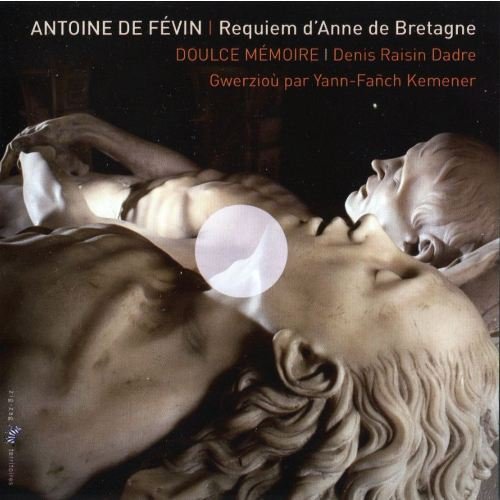Antoine de Fiévin - Requiem D'Anne De Bretagne (2011)

Artist: Antoine de Fiévin
Title: Requiem D'Anne De Bretagne
Year Of Release: 2011
Label: Outhere Sa
Genre: Classical
Quality: FLAC (tracks)
Total Time: 1:11:24
Total Size: 302 MB
WebSite: Album Preview
Tracklist: Title: Requiem D'Anne De Bretagne
Year Of Release: 2011
Label: Outhere Sa
Genre: Classical
Quality: FLAC (tracks)
Total Time: 1:11:24
Total Size: 302 MB
WebSite: Album Preview
01. Fiere attropos mauldicte (4:33)
02. Skolader yaouank (3:00)
03. Coeur Désolez (Plorans ploravit) (2:27)
04. Qui dabit oculis nostris (6:44)
05. Anaig ar Glaz (2:15)
06. Messe de Requiem - I. Introit Requiem aeternam (6:13)
07. Messe de Requiem - II. Kyrie (2:54)
08. Messe de Requiem - III. Graduel Si ambulem in medio umbrae mortis (2:57)
09. Messe de Requiem - IV. Verset Virga tua (2:29)
10. Messe de Requiem - V. Tractus Sitivit anima mea (2:58)
11. Messe de Requiem - VI. Fuerunt mihi lacrimae (3:00)
12. Messe de Requiem - VII. Misere mei Domine (3:10)
13. Messe de Requiem - VIII. Offertoire (Domine Jesu Christe) (5:01)
14. Messe de Requiem - IX. Verset Hostias et preces tibi, Domine (1:52)
15. Messe de Requiem - X. Quam olim Abrahae (1:14)
16. Messe de Requiem - XI. Sanctus (3:01)
17. Messe de Requiem - XII. Benedictus (1:58)
18. Messe de Requiem - XIII. Coeur Désolez (Dies illa, dies irae) (4:15)
19. Messe de Requiem - XIV. Agnus Dei (4:04)
20. Messe de Requiem - XV. Communion Lux aeterna luceat eis, Domine (2:52)
21. Messe de Requiem - XVI. In paradisum (1:32)
22. Messe de Requiem - XVII. Stabat Mater (2:55)
Doulce Memoire uses an ensemble of five singers; Paulin Bundgen (alto), Hugues Primard (tenor), Vincent Bouchot (baritone) and basses Marc Busnel and Philippe Roche. There’s an instrumental ensemble of seven (Eva Godard, Franck Poitrineau, Johanne Maitre, Elsa Frank, Jeremie Papaserio, Denis Raisin Dadre) playing cornet, sackbut, flute and dulcian. They mix various performance modes, ranging between unaccompanied, instruments and voices mixed and purely instruments. When using voices and instruments, not all the lines have voices as was the way in the period. De Lupus's motet Miserere Mei Domine and De La Rue's Coeurs desolees / Dies Irae are given in purely instrumental versions interpolated in the mass.
The result is intensely evocative and beautifully rendered. The singers create an ensemble in which line is paramount and the individual voices are nicely characterised whilst never compromising the whole. The plainchant combined with Fevin's rather straight harmony results in something rather sombre and dark, which develops into a remarkable richness when Fevin adds the second bass part. The singing is nicely balanced and they retain intensity for the full length of the piece; Fevin's Requiem could be quite a plain piece but Doulce Memoire ensure our interest is held.
They open with a pair of motets. Like De La Rue's Coeurs desolees / Dies Irae, Moulu's Iere attropos and Josquin Desprez's Coeur Desolez mix the sacred and secular, with one voice singing the sacred text and the others a secular one. The result is, to our ears, a funny mix but including such pieces helps us to start coming to grips with the fact that the past is certainly another country.
The group are also concerned to reflect the popular Breton support for Duchess Anne. So the polyphony is counterpointed with Breton solo songs - gwerziou, which in Breton means lament. These are sung by Yann-Fanch Kemener, a specialist in Breton monophonic songs. Kemener has a very distinctive voice which certainly contrasts with that of the singers in the ensemble and may not be quite to everyone's taste. Whilst I can appreciate the reasons behind the decision, I am not quite sure the contrast comes off. Additionally, I would rather have liked the Requiem itself broken up with some chant.
The CD booklet includes full texts and translations along with an essay about Anne of Brittany's obsequies and the music of the period. Rather wonderfully they also include contemporary illustrations of the obsequies plus the manuscript of the introit from the Requiem.
This is a lovely disc. If you are interested in Breton history then this will be essential listening. But for those of us with only a hazy grasp of such history, the disc beautifully illuminates the sacred music of the period."
The result is intensely evocative and beautifully rendered. The singers create an ensemble in which line is paramount and the individual voices are nicely characterised whilst never compromising the whole. The plainchant combined with Fevin's rather straight harmony results in something rather sombre and dark, which develops into a remarkable richness when Fevin adds the second bass part. The singing is nicely balanced and they retain intensity for the full length of the piece; Fevin's Requiem could be quite a plain piece but Doulce Memoire ensure our interest is held.
They open with a pair of motets. Like De La Rue's Coeurs desolees / Dies Irae, Moulu's Iere attropos and Josquin Desprez's Coeur Desolez mix the sacred and secular, with one voice singing the sacred text and the others a secular one. The result is, to our ears, a funny mix but including such pieces helps us to start coming to grips with the fact that the past is certainly another country.
The group are also concerned to reflect the popular Breton support for Duchess Anne. So the polyphony is counterpointed with Breton solo songs - gwerziou, which in Breton means lament. These are sung by Yann-Fanch Kemener, a specialist in Breton monophonic songs. Kemener has a very distinctive voice which certainly contrasts with that of the singers in the ensemble and may not be quite to everyone's taste. Whilst I can appreciate the reasons behind the decision, I am not quite sure the contrast comes off. Additionally, I would rather have liked the Requiem itself broken up with some chant.
The CD booklet includes full texts and translations along with an essay about Anne of Brittany's obsequies and the music of the period. Rather wonderfully they also include contemporary illustrations of the obsequies plus the manuscript of the introit from the Requiem.
This is a lovely disc. If you are interested in Breton history then this will be essential listening. But for those of us with only a hazy grasp of such history, the disc beautifully illuminates the sacred music of the period."



![Pauli Lyytinen - Rabbit Hole (2026) [Hi-Res] Pauli Lyytinen - Rabbit Hole (2026) [Hi-Res]](https://img.israbox.com/img/2026-01/07/rh1ibfj0mqsrzvd9597ic0qrl.jpg)

![Steve Davis - Eloquence (2009) [CDRip] Steve Davis - Eloquence (2009) [CDRip]](https://www.dibpic.com/uploads/posts/2026-01/1767988739_6.jpg)
![Kate Kortum - Wild Woman Tells All (2026) [Hi-Res] Kate Kortum - Wild Woman Tells All (2026) [Hi-Res]](https://www.dibpic.com/uploads/posts/2026-01/1767862862_ajiixgeb8lsxc_600.jpg)
![Ronnie Kole Trio - New Orleans' Newest Sound (1970) [Hi-Res] Ronnie Kole Trio - New Orleans' Newest Sound (1970) [Hi-Res]](https://img.israbox.com/img/2026-01/07/at02iaoa1931ewox4vnvpdeb3.jpg)
